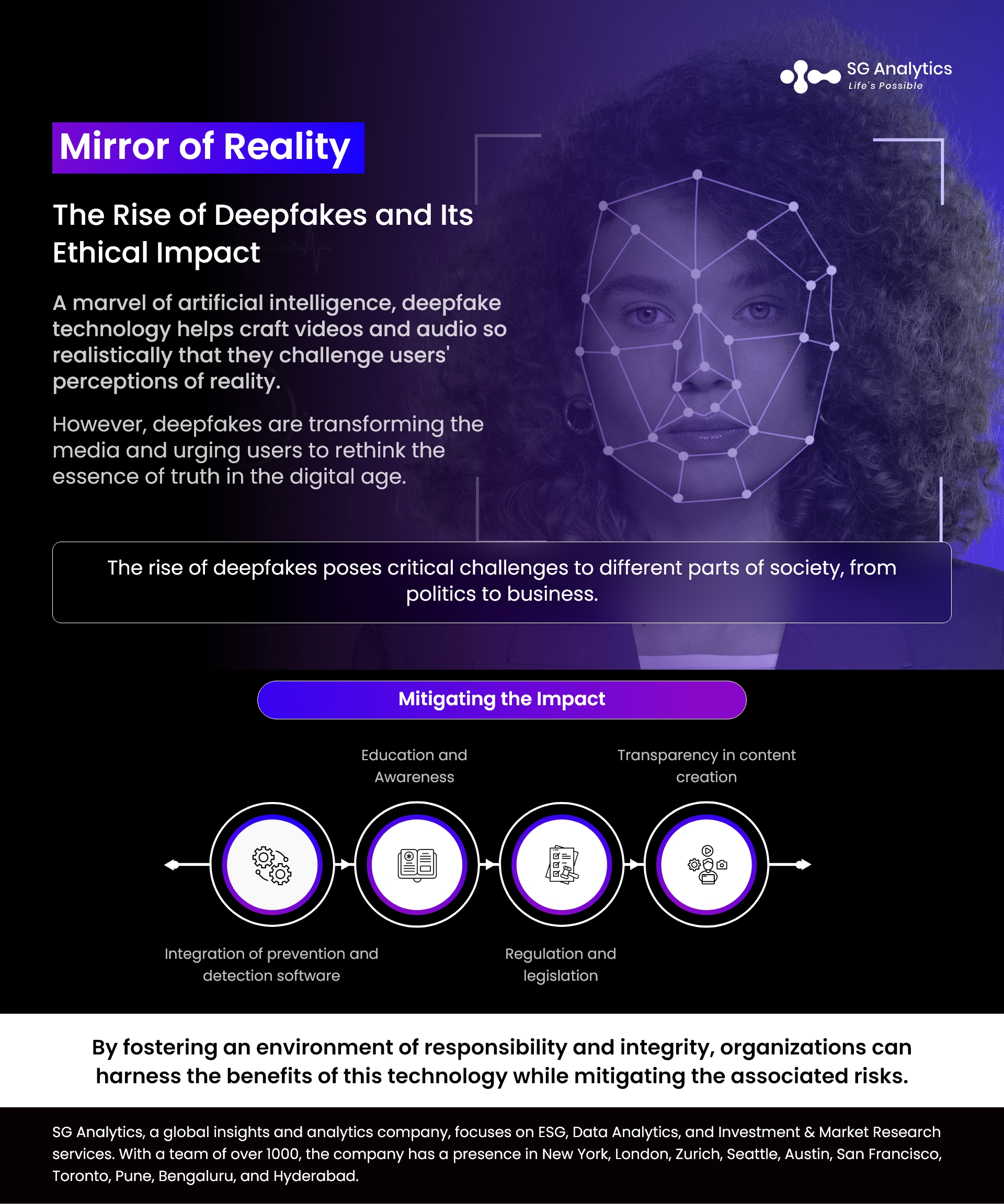An offspring of artificial intelligence, deepfake technology empowers software to analyze vast amounts of source material, like videos or audio recordings. The systems then leverage this information to synthesize realistic forgeries.
A marvel of artificial intelligence, deepfake technology helps craft videos and audio so realistically that they challenge users' perceptions of reality. With the immense creative possibilities of this technology unveiled, organizations need to step into the complex ethical arena, where every innovation needs to be weighed with a careful, human-centered approach.
However, deepfakes are not only transforming the media but also urging users to rethink the essence of truth in the digital age.
Understanding Deepfake Technology
The digital age has grown into an era of unprecedented connectivity and data flow. However, this convenience has created a breeding ground for deepfake scams and manipulation.
Deepfakes employs machine learning algorithms to generate audio and visual content with a high degree of realism.
Originally, the technology was considered a playground for researchers, but it has since permeated a broader spectrum of uses, including in film, advertising, and personal storytelling. However, its accessibility is raising significant concerns about privacy, consent, and misinformation.
Deepfake scams, a new phenomenon, pose a significant threat in this landscape as they can create artificial videos or audio recordings that can be incredibly realistic, making it difficult to identify real and fabricated content. This has opened a dangerous door for scammers, who are increasingly leveraging deep fakes for financial gain and other malicious purposes.
Read more: Navigating the Digitization Paradox: Balancing AI And Personal Touch in the Age of Automation

Social Media and the Deepfake Explosion
Over the past few years, the growth of deepfakes has been exponential. Deepfakes are synthetic media in the form of videos, audio, or images generated via artificial intelligence (AI) and deep learning algorithms. These algorithms utilize vast datasets to change or replace existing content. This process has reached a level of sophistication where it has become challenging to differentiate between genuine and fake content. By 2025, research predicts the rise in deepfakes shared online, consistent with doubling deepfakes every six months.
Social media platforms, where information is rapidly and widely distributed, play a critical role in the rise of deepfakes. A study highlighted that in 2022, less than one-third of global consumers were aware of what a deepfake was. This emphasizes the potential for misinformation to spread rapidly through these platforms.
Ethical Implications of Deepfakes & its Impacts on Society
The rise of deepfakes poses critical challenges to different parts of society, ranging from politics to business. The ethical controversy surrounding deepfakes is multifaceted. On the one hand, this technology is set to revolutionize content creation, equipping filmmakers and content creators with the ability to produce effects and scenes without physical or logistical constraints. On the other hand, when used without consent, deepfakes can disrupt lives and careers, misinform public opinion, and undermine trust in media.
Let's have a look at some ways in which deepfake is already impacting everyday life:
-
Political Manipulation
Deepfakes are already disrupting the political landscapes by projecting political figures saying or doing things they never did. This undermines trust in political leaders and can change public opinion and influence elections.
-
Misinformation and Fake News
In an era where information is being consumed rapidly through different media channels, deepfakes contribute to spreading misinformation. Crafting videos that appear genuinely real can lead to the widespread dissemination of false information. The rapid spread of deepfakes across social media is worsening the already prevalent issue of misinformation. Deepfakes are being used for harmful purposes, such as creating fake content without user consent across platforms.
-
Impact on Business
The corporate world has also been affected by the influence of deepfakes. From CEO impersonation for scams to fraudulent content, businesses are facing new challenges to protect their reputation while also maintaining trust.
Read more: Unlocking The Potential of Generative AI to Enhance Customer Experiences

-
Privacy and Consent
Privacy concerns are looming large as deepfake technology is being used to create images and videos of individuals without their consent. It is crucial to establish and enforce guidelines and laws that help protect an individual’s rights in digital spaces while also ensuring that the use of such technologies is consensual and transparent. This further raises serious concerns about privacy and has led to calls for more legislation to protect individuals from deepfake media.
Mitigating the Impact
As of 2024, several organizations and developers are integrating measures to detect deepfake videos as well as authenticate media. AI-powered tools are being developed to verify content authenticity and enhance public awareness about manipulated media.
Professional associations and regulatory bodies are also working together to set ethical standards for using deepfake technology. These standards incorporate transparency guidelines, like watermarking synthetic content and disclosing the use of AI for content creation. Such measures are critical for maintaining integrity and trust.
Every stakeholder in the AI space, from developers to end-users, needs to take responsibility and ensure the ethical deployment of deepfakes. It is also important to stay informed about the capabilities and risks associated with AI-generated content and adhere to best practices to safeguard public trust and rights.
Addressing these challenges requires a major approach involving technological advancements and legislation. Some potential strategies include:
Read more: Ethical Concerns Associated with Generative AI
-
Integration of Prevention and Detection Software
Investing in developing and deploying advanced deepfake detection and prevention technologies will help identify and filter out artificial content across platforms such as social media or news sites.
-
Education and Awareness
Educating the users about the existence of deepfakes and their potential risks could help prevent and detect deepfakes. Within businesses, employees can undertake awareness and training courses to mitigate damaging personal and professional reputations.
-
Regulation and Legislation
Governments and regulatory bodies need to actively work on making, updating, and implementing laws that address the spread of deepfakes, thus creating clear consequences for those who misuse the technology. Sharing information, best practices, and technological advancements can further help create strong protection against the misuse of deepfakes.
-
Transparency in Content Creation
Social Media platforms need to focus on transparency in content creation, thus making it easier to verify the authenticity of the online content they encounter. This involves watermarking, certification forms, or the use of third-party validation tools for media integrity.
Key Highlights
- Deepfakes are computer-generated photo, audio, or video media that can realistically impersonate a real person.
- AI-generated deepfake technology has many implications for voters, politicians, social media platforms, public figures, businesses, and civilians.
- As deepfake technology grows, users must engage with it mindfully and ethically.
Read more: Integrating Generative AI In Banking: Risks and Benefits

Navigating the Future
With the rise of Chat GPT and other technological innovations, deepfakes will continue to evolve and become more sophisticated in the future. This is raising some serious concerns over its societal influence. As AI algorithms are advancing rapidly, the line between authentic and manipulated content is starting to blur, with growing implications for people, privacy, and trust.
Deepfakes are becoming more convincing, and there is a growing risk of losing trust in digital content. People are becoming more skeptical of the authenticity of any video or image, leading to an atmosphere of doubt. This is set to have major implications in high-stakes industries such as law enforcement and justice, where evidential integrity is critical.
This growth of deepfake technology and the surge in deepfake content highlight the urgency for sophisticated software and legislation. Striking the right balance between innovation and safeguarding against harmful misuse will be vital. This will require a collaborative effort from technology developers, lawmakers, and the public to examine synthetic media.
As deepfake technology grows, users must engage with it mindfully and ethically. By fostering an environment of responsibility and integrity, organizations can harness the benefits and mitigate the associated risks. Organizations and individuals can collectively work towards mitigating the negative impacts of deepfakes, thus preserving the integrity of the digital realm.
A leading enterprise in Generative AI solutions, SG Analytics focuses on unlocking unparalleled efficiency, customer satisfaction, and innovation for the client with end-to-end AI solutions. Contact us today to harness the immense power of artificial intelligence and set new benchmarks in operational efficiency, customer satisfaction, and revenue generation.
About SG Analytics
SG Analytics (SGA) is an industry-leading global data solutions firm providing data-centric research and contextual analytics services to its clients, including Fortune 500 companies, across BFSI, Technology, Media & Entertainment, and Healthcare sectors. Established in 2007, SG Analytics is a Great Place to Work® (GPTW) certified company with a team of over 1200 employees and a presence across the U.S.A., the UK, Switzerland, Poland, and India.
Apart from being recognized by reputed firms such as Gartner, Everest Group, and ISG, SGA has been featured in the elite Deloitte Technology Fast 50 India 2023 and APAC 2024 High Growth Companies by the Financial Times & Statista.









